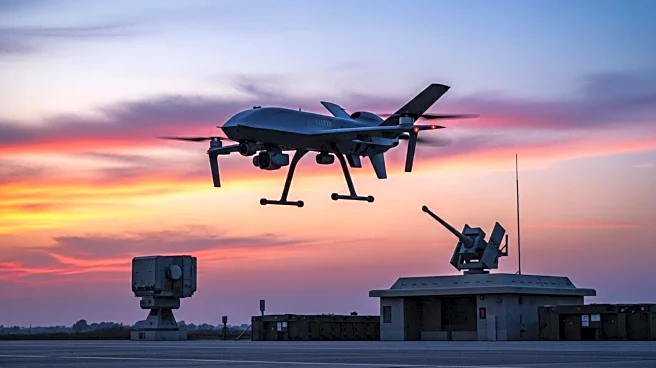What's Happening?
The defense sector is experiencing a significant influx of investment as geopolitical tensions escalate globally. According to the Stockholm International Peace Research Institute, global defense spending reached a record $2.718 trillion in 2024, marking a 9.4% increase, the steepest rise since the Cold War. This surge is driven by increased spending in Europe, the Middle East, and Russia. European countries, particularly those bordering Russia, have significantly boosted their defense budgets, with Germany increasing its budget by 28% to $88.5 billion and Poland by 31% to $38 billion. The shift in investor perception is evident as the number of exchange-traded funds (ETFs) investing in the defense sector has grown from four in 2022 to 27, with assets managed through these vehicles increasing nine-fold to over $35 billion.
Why It's Important?
The increased investment in the defense sector highlights a shift in global priorities, with nations focusing on strengthening their military capabilities amid rising geopolitical tensions. This trend has significant implications for the U.S. defense industry, which remains the largest supplier of military equipment and services worldwide. The European response to Russian aggression and the U.S.'s apparent withdrawal from active global security leadership could lead to a decoupling of U.S. and European defense strategies. This shift may impact U.S. defense contractors, who are establishing new partnerships to remain part of the European defense ecosystem. The growing defense budgets in Europe could also lead to increased demand for military technologies, presenting opportunities for innovation and growth in the sector.
What's Next?
As geopolitical tensions continue to rise, further increases in defense spending are expected, particularly in Europe. The European Commission has proposed financing several defense initiatives, including a €800 billion fund over four years. The U.S. defense industry may face challenges due to tariffs and global supply chain issues, but it is likely to maintain its position as a leading supplier of military equipment. Investors will continue to monitor the evolving geopolitical landscape and its impact on defense stocks, which have shown significant gains in recent years. The integration of new technologies, such as artificial intelligence and unmanned vehicles, will be crucial for military planners seeking an edge in modern warfare.











